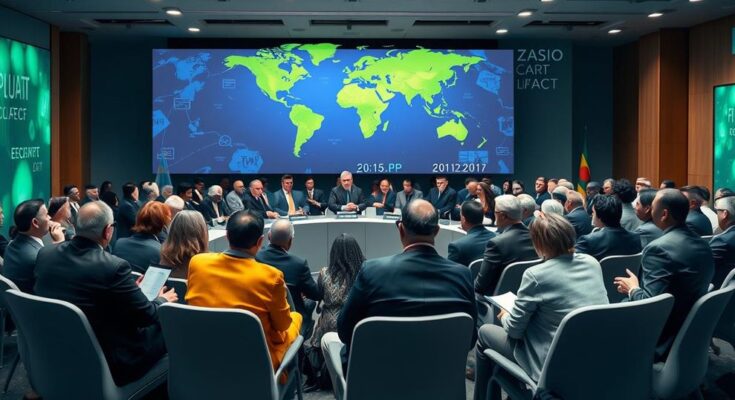The forthcoming COP29 in Azerbaijan exemplifies the problematic UN practice of hosting climate conferences in countries with poor human rights records. As the regime of President Ilham Aliyev faces international criticism for human rights abuses, the legitimacy of climate discussions is called into question. Increasing political repression and a significant rise in political prisoners further underscore the concerns surrounding hosting such pivotal discussions in an authoritarian state.
The upcoming United Nations Climate Change Conference, COP29, which is set to commence on November 11 in Azerbaijan, raises significant concerns about the legitimacy of hosting climate discussions in a country governed by a repressive regime. Unlike other important criteria such as a nation’s infrastructure and financial capability, the selection process does not account for democracy or human rights. This has led to the unfortunate reality of facilitating ‘greenwashing’ of oppressive governments that simultaneously exploit fossil fuels. Azerbaijan has previously hosted climate conferences alongside other authoritarian states such as the United Arab Emirates and Egypt. Although the Baku conference aims to set new financial goals for climate action, it cannot overshadow the grim reality of Azerbaijan under President Ilham Aliyev, who presides over a government notorious for systematic human rights abuses. Following a letter from 60 U.S. lawmakers urging the Biden administration to advocate for the release of political prisoners in Azerbaijan, President Aliyev dismissed these concerns, deeming them ‘disgusting.’ Nonetheless, Azerbaijan’s troubling human rights record is well-documented, compounded by the recent military aggression towards ethnic Armenians in Nagorno-Karabakh, resulting in significant political imprisonment. Reports indicate a troubling increase in political prisoners, with the number surging from 122 in December 2021 to over 300 as of June 2023. One prominent case is that of Gubad Ibadoghlu, an economist sentenced to imprisonment under fabricated charges for exposing government mismanagement. Despite being moved to house arrest, his situation remains perilous due to ongoing surveillance and the potential for rearrest. Activists like Anar Mammadli, who has been detained on false currency smuggling charges, exemplify the Azerbaijani government’s tactics to suppress dissent. The government maintains a tight grip on political competition, systematically dismantling independent media and thwarting civil society organizations. These actions culminate in a chilling environment for human rights—especially troubling as the nation prepares to host a significant climate conference. Considering the backdrop, it becomes clear that continuing to confer legitimacy upon such regimes under the guise of climate negotiations is counterproductive. It would be prudent for the United Nations to consider hosting future conferences in nations with both strong environmental and democratic credentials to avoid endorsing oppressive governments.
The choice of host countries for United Nations climate conferences is often rooted in criteria such as infrastructure, political stability, and financial resources. However, democracy and human rights have not been prioritized, leading to a pattern of hosting in repressive states. COP29, taking place in Azerbaijan—a country marked by a record of human rights violations under President Ilham Aliyev—exemplifies this troubling trend. Recent geopolitical events, including military actions in the disputed Nagorno-Karabakh region, have heightened concerns around the treatment of political prisoners and the suppression of civil society in Azerbaijan, raising key questions about the implications of hosting international discussions on climate change in such contexts.
In conclusion, the decision to host COP29 in Azerbaijan serves to highlight a significant ethical paradox inherent in the United Nations’ selection criteria for climate conference hosts. The lack of regard for human rights and democratic values not only discredits the climate dialogue but also implicitly legitimizes oppressive regimes. Moving forward, a comprehensive reevaluation of hosting policies is essential, with an emphasis on selecting countries that are not only environmentally responsible but also uphold democratic principles and human rights.
Original Source: www.washingtonpost.com




